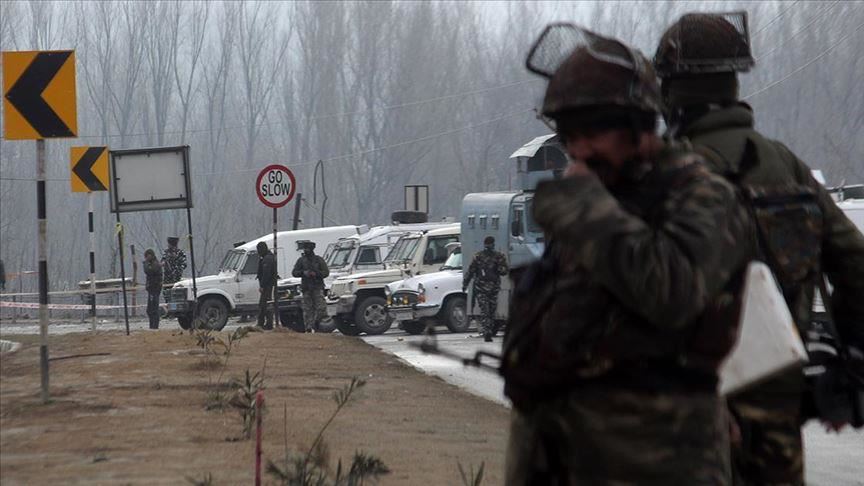UN names Jaish-e-Mohammad head global terrorist
Security Council passes US-sponsored move after Pakistan and China withdraw their objections, says Islamabad

KARACHI, Pakistan
The UN Security Council on Wednesday declared Maulana Masood Azhar, head of the Pakistan-based Jaish-i-Mohammad group, a global terrorist after China withdrew its longstanding opposition to the move, according to Pakistani officials.
Confirming the move, Pakistan said Beijing had withdrawn its opposition to the U.S.-sponsored move after consulting Islamabad.
Pakistan will not be affected by the development, as the council passed the resolution only after “our reservations were addressed,” Foreign Ministry spokesperson Mohammad Faisal told reporters in the capital Islamabad.
“Earlier proposals to list Masood Azhar failed to generate the requisite consensus in the sanctions committee as the information did not meet its technical criteria,” he said.
“These proposals were aimed at maligning Pakistan and the legitimate struggle of the people of Indian-occupied Jammu and Kashmiri for the realization of the right to self-determination and were thus rejected by Pakistan, which has always maintained that resolution of any listing issue should be by consensus, through objective dialogue and consultations, within the 1267 Committee framework and most importantly without politicization.”
“India paints it as a victory, and as a confirmation of its narrative, but these claims are false,” he added, saying the resolution was passed after Azhar was delinked with the ongoing freedom struggle in Indian-administered Kashmir.
“The current listing proposal has been agreed after all political references, including removal of attempts to link it with Pulwama [attack] and maligning the legitimate struggle of the Kashmiris in IOK [Indian-occupied Kashmir] for realization of the right to self-determination," he said, referring to a February suicide attack on an army convoy in Indian-administered Kashmir that killed at least 40 Indian troops.
- India hails ‘step in right direction’
Faisal reiterated Prime Minister Imran Khan’s position that “there is no space for any proscribed organization or its affiliates to operate from Pakistani territory” and its resolve to fight terrorism in all its forms.
Faisal said his country would immediately implement the Security Council resolution with travel and financial bans on Azhar.
Welcoming the news, the Indian government called the move “a step in the right direction to demonstrate the international community’s resolve to fight against terrorism and its enablers.”
"This is in accordance with India’s position and in line with the information that India has shared with the members of the Sanctions Committee regarding terrorist activities of Masood Azhar and the Jaish-e-Mohammad," said the Ministry of External Affairs spokesperson.
"India will continue with its efforts through international forums to ensure that terrorist organizations and their leaders who cause harm to our citizens are brought to justice," it added.
Syed Akbaruddin, India’s ambassador to the UN, said on Twitter, "Big, small, all join together. Masood Azhar designated as a terrorist in @UN Sanctions list. Grateful to all for their support. #Zerotolerance4Terrorism."
India, accusing Azhar of colluding with Pakistani intelligence agencies in the February attack, had long demanded Azhar’s designation as a global terrorist.
But China, Pakistan’s longtime ally, had used its veto against such moves.
In March, after the Kashmir attack, Pakistan launched a crackdown on banned militants, including members of Azhar’s group, and arrested dozens of its members.
The government took control of a religious seminary (madrassa) in the northeastern city of Bahawalpur claimed to serve as the group’s headquarters.
However, there is no official word on the whereabouts of the leader of the group, which has been banned in Pakistan since 2002.
In February, Islamabad froze the assets of dozens of banned groups and individuals across the country under an order from the UNSC.
- Kashmir
Jammu and Kashmir, a Muslim-majority Himalayan region, is held by India and Pakistan in parts and claimed by both in full. A small sliver of Kashmir is also held by China.
Since they were partitioned in 1947, the two countries have fought three wars -- in 1948, 1965 and 1971 -- two of them over Kashmir.
Also, in Siachen glacier in northern Kashmir, Indian and Pakistani troops have fought intermittently since 1984. A cease-fire came into effect in 2003.
Some Kashmiri groups in Jammu and Kashmir have been fighting against Indian rule for independence, or for unification with neighboring Pakistan.
According to several human rights organizations, thousands of people have reportedly been killed in the conflict in the region since 1989.
*Islamuddin Sajid from Islamabad, Ahmad Adil from India contributed to this report
Anadolu Agency website contains only a portion of the news stories offered to subscribers in the AA News Broadcasting System (HAS), and in summarized form. Please contact us for subscription options.







